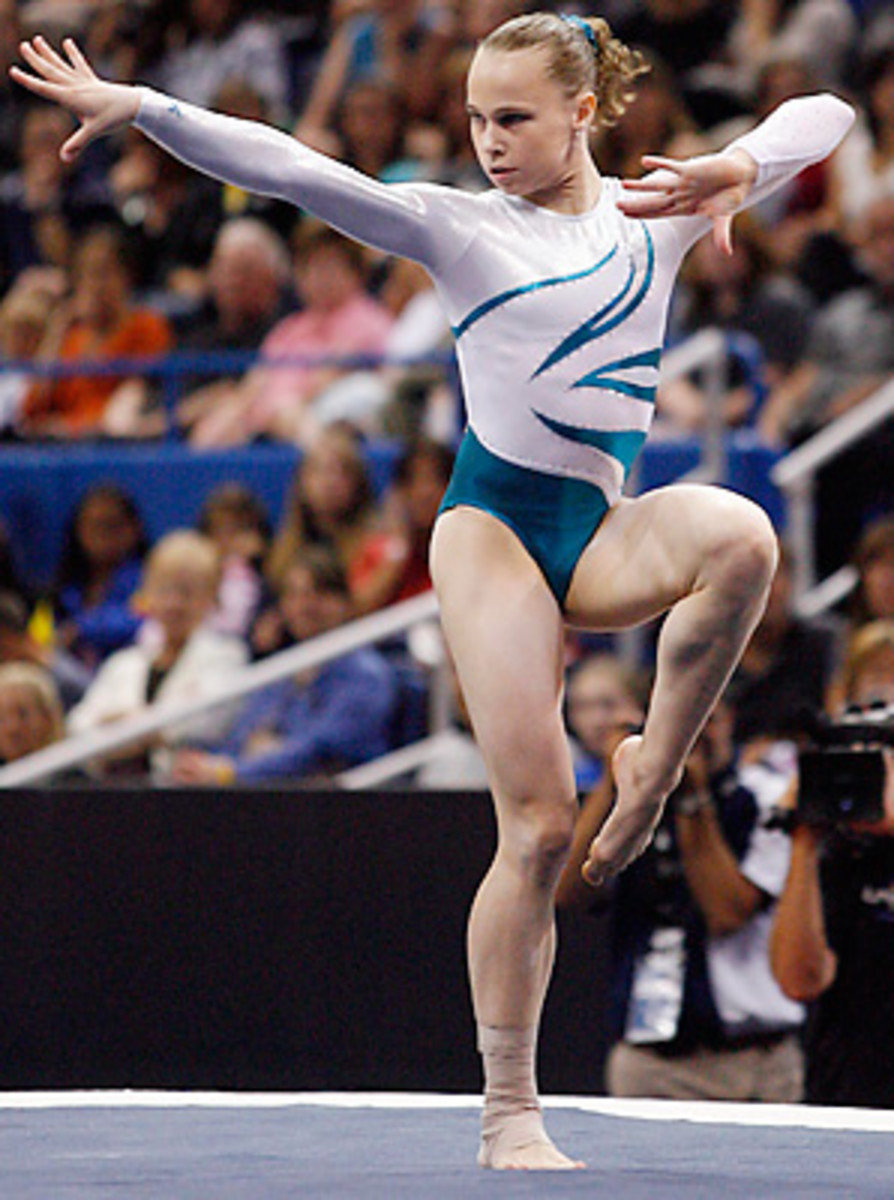
One Year Out: Bross could become U.S.' third straight golden gymnast
The World Olympic Gymnastics Academy in Plano, Texas, wears its reputation on its windows.
The windows depict 2004 Olympic all-around champion Carly Patterson with Olympic medals dangling from her neck, an olive wreath resting on her head, and the Parthenon in the background. Patterson was the first American to take the sport's greatest prize since Mary Lou Retton in 1984.
The windows also depict Nastia Liukin, in her pink leotard, beaming after winning the 2008 Olympic all-around title in Beijing.
Patterson and Liukin were both products of this 30,000 square-foot facility, known simply as WOGA, which Valeri Liukin, a former Soviet gymnast and Nastia's father, opened in 1994.
Rebecca Bross, 18, walks past the windows and through the doors twice a day. She's the hope to keep the U.S.' and WOGA's streaks alive.
"Every kid in the sport, their dream is to be in the Olympics," said Bross, the reigning American champion and two-time world all-around medalist. "Over a period of time, I've seen what [Carly and Nastia] did and what they went through, and I'm kind of going through the same thing in training."
Bross is a curly brown-haired dynamo. She wowed her parents by climbing in and out of a Little Tikes car at age one and doing perfect cartwheels at five. At 10, Bross and her mom, Donna, moved from Michigan to Plano because of WOGA. About that time, U.S. national team coordinator Martha Karolyi got her first look at Bross.
"Fearless and very, very ambitious," Karolyi said. "I said, 'Valeri, this little girl is going to become something.'"
Mother and daughter got an apartment, but the gym became Bross' home. She trained under Valeri and with Nastia and watched her trailblazers win Olympic gold medals on TV.
"It was pretty awe-inspiring," her mother said. "You can think, wow, maybe one day, if we're lucky, she can be there, too."
The day after the Liukins returned from Beijing in August 2008, Valeri went back to the gym and back to Bross, one of a handful of elite gymnasts he coaches among the 3,000 spread across WOGA's three Dallas-area pods.
Bross trains seven hours a day, fitting home schooling between her workouts. She was seven months too young for the 2008 Olympics, but made her world championship debut in 2009 at the same venue as the 2012 Olympics. Bross was the leader for the all-around title after three of four events, but landed on all fours on her final tumbling pass on floor exercise, her final event. She settled for silver.
In 2010, Bross won the U.S. all-around title and bronze at the world championships, competing with a stress fracture in her right shin that required surgery at the end of last year. She is just now fully recovered. Though Bross has proved the best in the U.S., the 2010 world championships saw the emergence of 16-year-old Russian Aliya Mustafina, who won five medals including all-around gold. But Mustafina tore her left ACL on a vault landing last April and may not compete against Bross before the London Olympics. By then, other gymnasts may emerge.
"This is what sets up the Olympics so brilliantly; we love this type of showdown," NBC gymnastics analyst Elfi Schlegel said. "Something tells me there's going to be a Russian, an American and probably a Chinese athlete in the picture. ... Rebecca is a great athlete, but there are going to be other American athletes that are going to rise to the occasion as well."
Making the U.S. team is not a given, especially with a new rule that shaves the Olympic roster from six to five. Olympic and world champions Shawn Johnson, Alicia Sacramone and Chellsie Memmel are on comebacks. Even Liukin is still training, just in case she feels the itch. There's also the next generation of teens like Jordyn Wieber, 16, who handed Mustafina defeat in March and appears the biggest threat to Bross at the U.S. championships in three weeks and the world championships in October.
Turnover in women's gymnastics is constant. The last seven Olympic all-around champions didn't return for the next Games. London is likely Bross' only chance to join Mary Lou, Carly and Nastia among the icons of the sport.
"The goal is to become Olympic champion," Valeri Liukin said. "We don't talk about the medals normally, but I'm sure that's what her goal is. That is my goal. Working that hard is not that interesting if you don't dream big."





